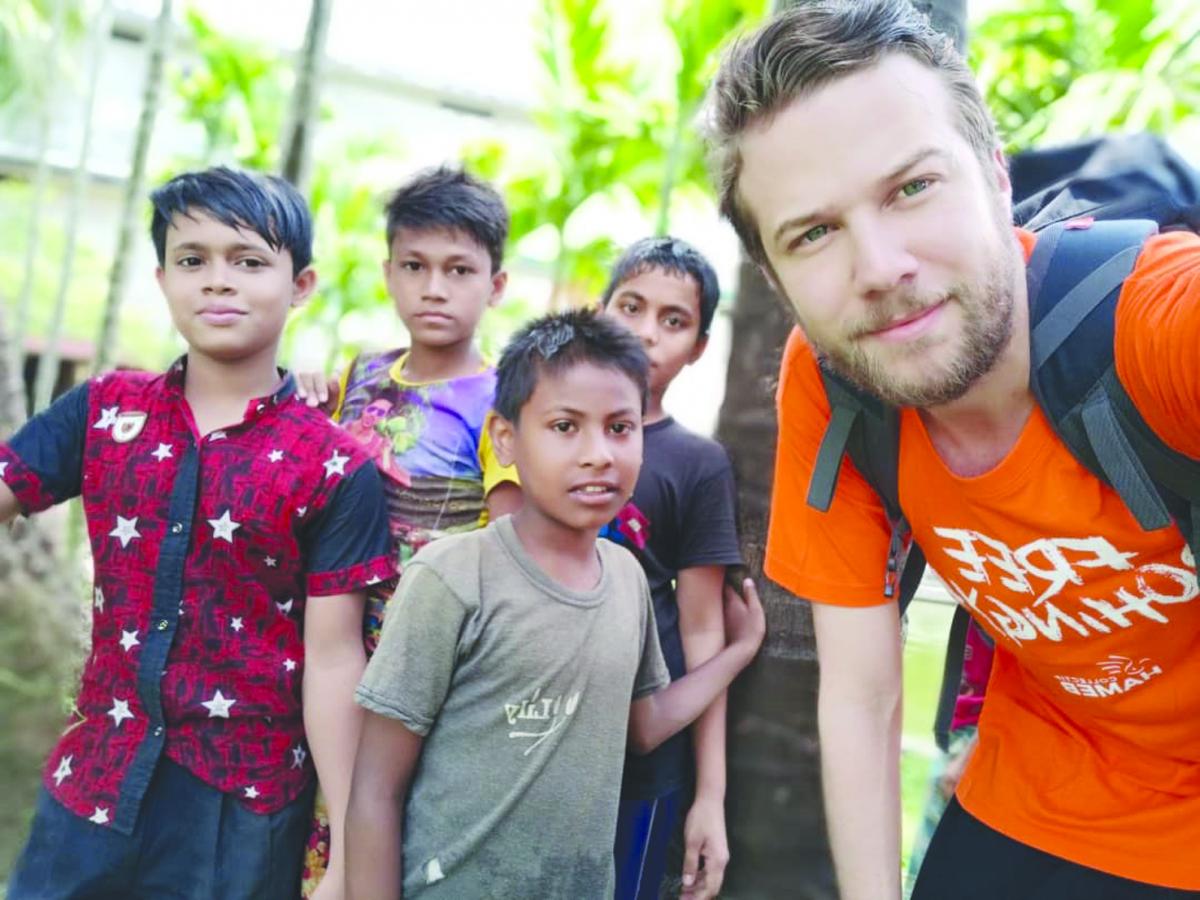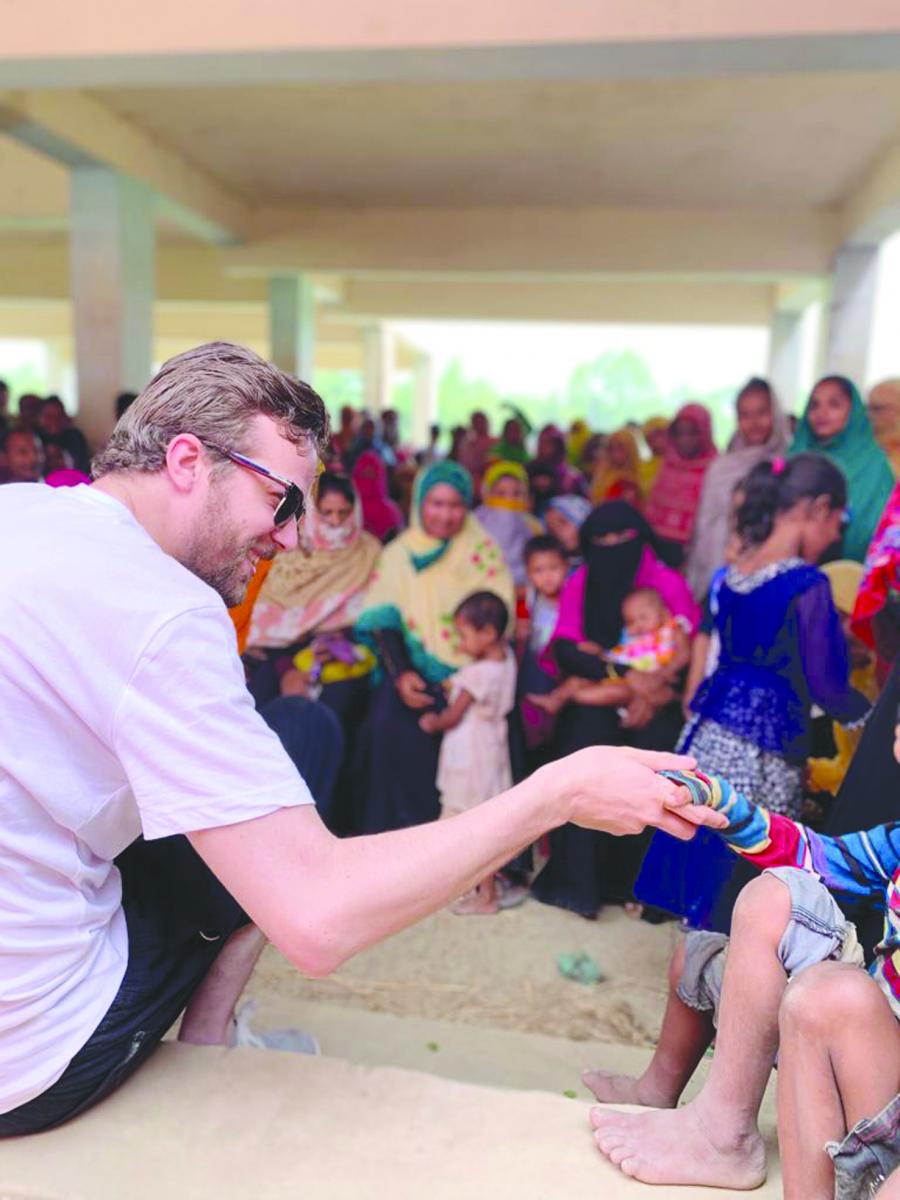* Yassin Abd El Gabar: “I would see many distressing images on activist social media pages, but my sympathies fell silent as I felt that I had no method of reaching out to them and helping.”
*Yassin Abd El Gabar: “Why don’t Muslims helping Rohingyas get the same attention as those who carried out the Sri Lanka attacks?”
Social media outlets across the Arab world spread the news of a young Algerian physician who decided to spend Ramadan caring for Rohingya refugees residing in the Kutupalong camp located on the shared Myanmar Bangladesh border. Photos of the 29-year-old carrying a backpack full of medicines and wearing a stethoscope over his neck made Yassin Abd El Gabar a sensation across his home country of Algeria.
Abd El Gabar’s decision to go to Kutupalong was not an easy one since Ramadan is a time in which families spend precious time together; he nevertheless made the sacrifice to provide care for those who needed it most.
Majalla met up with Abd El Gabar after he returned to Algeria, where he shared his experiences and stories of the nightmare that the Rohingya refugees are enduring. When asked about his reasons for making the trip he said that he has a long history of working with humanitarian groups in Algeria while he was a student and has made several charity trips across many Algerian governorates. One time he traveled as far as Ain Kazan, which is the farthest point in the Algerian desert.

Abd El Gabar also had a compassionate reason for traveling to Kutupalong: “I would see many distressing images on activist social media pages, but my sympathies fell silent as I felt that I had no method of reaching out to them and helping.” Fortunately, he would eventually get his opportunity to provide aid for said refugees. One of Abd El Gabar’s friends is a head of a charity organization in France, and just before Ramadan his friend announced that he needed volunteers to help distribute Ramadan provisions to Rohingya refugees, so he phoned his friend and asked him if the charity needed a doctor and the arrangements were made. Abd El Gabar understood that he would be exposed to many hazards during his travels; he even knew that he risked dying, but none of that mattered to him since nothing would come between him and his humanitarian mission. “I am not a wealthy businessman, but I have medical training which I can use to help these refugees.”
After he packed up his medical supplies, Abd El Gabar went on to obtain a visa to travel to Bangladesh, but he faced a dilemma namely the fact that Bangladeshi authorities have been returning travelers who come to help the Rohingya refugees. So he had to pretend that he was traveling as a tourist rather than a philanthropist. “Security officials at the airport thoroughly questioned me; they did not comprehend why an Algerian would go to Bangladesh for tourism, but after 45 minutes of continuous investigation I was able to convince them that I was an avid traveler who chose Bangladesh as his next destination due to its beautiful scenery and the fact that the trip coincided with Ramadan helped my case.”
Abd El Gabar spent two days in Dhaka, staying with a Rohingya refugee representative. He then went to southeast Bangladesh to join the other charity activists who had 100 tons of food and medical supplies with them. Then they headed to the camp, passing through a harsh jungle path trying to avoid Bangladeshi troops who capture activists like them.

Abd El Gabar stated that local groups help these activists reach the camp: “There are local groups that help facilitate our mission, for instance, they provide us with primitive means of transport and plan routes that help us avoid soldiers. Some of these groups are humanitarian ones, while others are motivated by profit, but this is the case all over the world”.
The camp is located at the city of Cox’s Bazar of the state of Chittagong, which borders Myanmar (Burma). Since August 2017, Myanmar came under international scrutiny after its army and extremist Buddhist militias started a genocide against the Rohingya Muslim minority, thus forcing them out of the country. Since then the refugees have stayed at asylum camps in the outskirts of Cox’s Bazar which has become a global destination for media correspondents, charities and international delegates. There are currently 800,000 persecuted Rohingya Muslims and the United Nations has listed them as one of the most persecuted minorities around the world.
The activists at the Kutupalong camp directed Abd El Gabar towards schools that had orphan children who lost their parents during the genocide. He met with the children, diagnosed them and prescribed medication for them. He then bought the medicine which he personally delivered to the children.
Abd El Gabar stated that the camp lacks the basic necessities for human life as it does not have food, water, medicine or a sewage system and their conditions make it easy for diseases to spread. He also said that “This is the largest refugee camp in the world and it houses almost a million refugees whose only hope for survival is the aid that comes from here and abroad.”

The doctor spoke more on the causes of the refugees’ misery: “The refugees cannot travel into Bangladesh because they do not have identity documents, and they can’t go back to their homes in Burma because of the bombs planted at the border, as such they are trapped in the camp. But those who are in the camp are actually the lucky ones since many did not make it through the dangerous journey of seas and jungles and many had to resort to eating grass for survival. As a result, many Rohingya die before reaching the camp.”
He further noted that the refugees are suffering from diseases that were last heard of during the previous century as many of them have come down with the measles. In addition to these archaic illnesses, shortness of breath, high blood pressure, and diabetes are common in the camp.

Abd El Gabar then emphasized that “The camp is teeming with horrific stories and anecdotes, there is that one boy who lost all his family members and is now alone, I met an elderly widow who lost her husband and now has no one to take for her, and I also met a mother who lost all her children one by one right in front of her eyes. There are other stories with shocking details that reveal the magnitude of their misery, furthermore, their lack of identity documents means they can’t do anything to help themselves.”
Despite all the horrors he has seen, Abd El Gabar said that he intends on returning to the camp, as a matter of fact, he made a promise to the refugees that he would visit every year to deliver provisions. He also said that he would announce relief projects for the Rohingya, the projects will be in Algeria and they will aim to provide the refugees with food, medicine, and clothing.
He also revealed that he received a call from a high-level government official who expressed her gratitude for his actions and considered him a great example for Algeria. She further expressed readiness to assist in other solidarity initiatives in the future. He then told Majalla of a new national association that would provide relief to the Rohingya Muslims.

On his family’s views of his travels he said: “My parents didn’t approve of my trip since going to a war zone puts me at risk of death or imprisonment, but I tried convincing them by stating that I’m going there for peaceful and humanitarian purposes, so whatever happens to me is going to happen.”
He ended the interview with this statement: “I am one of the tens of young Muslims who came from five different continents to help these refugees. We came here through two charities; the first is called “je vous aime” which is headed by Mohamed Karim Daragy and the second is called “HAMED” which is headed by Nour El Din. Why don’t many young Muslims volunteer for such charities rather than bombing religious shrines and public areas? Why don’t Muslims helping Rohingyas get the same attention as those who carried out the Sri Lanka attacks?









